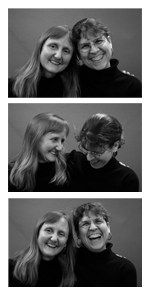Asking for the secret to a successful writing partnership is like asking for the secret to a happy marriage. Who would you even ask?
But I have a happy writing partnership, and lately people have been asking us how we do it. Sometimes we even ask ourselves. As long as I’ve been giving it some thought, let me share a few ideas.
 1. It’s partly magic.
1. It’s partly magic.
I suppose that’s not helpful, but I really believe that any good relationship involves that special something: chemistry, or ingredient X, or really good luck. We didn’t know we had it until after we floundered through our first project together. When we finished, we were both a little flabbergasted by how incredibly well it went. We’ve done a few more projects together since then, and it’s still going flabbergastingly well.
Our partnership started the day Deanna came to my door and asked if I wanted to write a musical with her. She’d always liked reading my annual Christmas letter, and wondered if I thought I could write a play. Good question. I knew her as a singer, voice teacher, and a choir director, but I didn’t know if she could compose music. It’s possible she didn’t know either. So I said yes, because, why not?
Initially, we were almost painfully courteous because we didn’t know what we were doing, or what we could expect from each other, or even know what we ought to expect. Initially we were fortunate that we liked everything the other person did. But eventually we had to say hard things. Eventually we had to say no. Eventually came the moment of truth when someone put in a lot of work on something, and the other person had to say she didn’t like it. And that wasn’t easy for either of us.
A few things made that process work better, and those are my next tips.
2. Even though it’s hard, we’re honest with each other, because frankly, there’s no point in working with a partner who won’t tell you what she likes or doesn’t like honestly. And we both believe that.
3. We usually discover we agree with each other’s observations after we talk a bit, so it’s helpful to talk, and to listen, and to keep an open mind. And it’s helpful that we end up agreeing a lot. That might be a little of the magic at work.
4. We don’t exaggerate the problems, regardless of which side of the criticism we’re on. For instance, I remember once liking a song, but getting bored with it before it ended, and thinking it was maybe just a little too long, or that it needed to change up a little before the end. But I really did like the song. She doesn’t get upset and threaten to throw away or replace the whole thing. In the end, I think we dropped a verse, and changed up the pattern of the song structure a little, and it worked great.
5. And we both make a point of not taking offense. That helps a lot.
A big, big tip is to:
6. Check your egos. Be willing to accept when your partner tells you honestly what she thinks. Don’t doubt it when your partner says she likes something, and don’t take it hard when she says she doesn’t. If the partnership is working well, it’s like working with an enhanced version of yourself, and there are plenty of times I look at my own work and see plenty that I want to revise or trash. We’ve just broadened our sense of ourselves to include the other.
 One of the hardest things I ever had to do was to make a change when I thought Deanna was wrong. . So I resisted making the change. But it was important to her, and she persisted, and finally persuaded me to come around to her point of view.
One of the hardest things I ever had to do was to make a change when I thought Deanna was wrong. . So I resisted making the change. But it was important to her, and she persisted, and finally persuaded me to come around to her point of view.
It wasn’t an easy change to make. It involved adding a song that didn’t really fit the scene, and would require a lot of rewriting. And once I actually started trying to figure out how to shoehorn that song in, some really good things started to happen. The new dialogue was really funny, the new characters added a lively dynamic, and the new material ended up being a high point of the show.
Two good tips came out of that.
7. I learned to trust my partner. It took an investment of time and experience, but I’m much quicker to make changes she requests now if they’re important to her, even if I don’t agree, because I realize I can trust her. And,
8. I realized I can trust myself. I can count on my creativity, and when I have to make major change, even it involves throwing away good material, which always hurts, I know that I’ll be able to write something really good to replace it.
9. And we’ve come to count on each other to speak up when something is important.
10. It doesn’t hurt that we have separate areas of expertise, without a lot of overlap. It prevents us from being tempted to micromanage the other person, a situation neither of us would tolerate well. It’s possible that trust comes more easily when we don’t know enough to second guess each other. What I don’t know about music could fill an anthology, so I can know in a general sense when I don’t believe a song fulfills the goals of a scene, but I can’t fuss over the details.
Once when we were talking about it, Deanna summed it up with this quote from Toni Morrison:
She is a friend of my mind. She gather me, man. The pieces I am, she gather them and give them back to me in all the right order.
I don’t know what works for other partners. I don’t know if what is working for us will last. But I know I love working with my partner, and that the work I do with her is more fulfilling and better than any I do without her.
I hope it’s not all magic. I hope that by being courteous, and honest, and mindful, we can keep this partnership going for a long, long time.
Photo by Ana Komro. Clip Art from openclipart.org.
